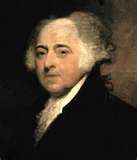Now my sister is not the shy retiring type that I am - ;-) - and so she asked her, "Did you actually read the Constitution?" "Well, no...but I know what it says..." and went on with her harangue, misquoting and mangling the document -- rhetorically not physically.
To my sister and me, it was a reminder us of being dragged off to tent revivals by our grammaw where various lay preachers would thump the good book, tell us what it said, and threaten us if we doubted them.
The problem with the thumpers is that in the words of the founding fathers, the constitution, or the bible or other holy books, you can cherry pick phrases that agree with your beliefs and ignore those that don't. If your audience doesn't know any better and hasn't studied the details themselves, you can say just about anything. Psychologist know that if the idea is repeated often enough, you will come to believe if, even when faced with hard facts to the contrary.
Here's an example from a letter to USA Today (7/1/10) from a writer commenting on the passing of Senator Robert Byrd of West Virginia.
Our Founding Fathers did not intend congressional positions to be life-long ones. They felt that it was the duty of our leaders to give of their time and manage their states temporarily, and that this was in the best interests of their constituents...
We have senators...[who] have become professional politicians.
He goes on to support term limits AND age limits.
There are many good arguments for and against term limits...but how the founding fathers "felt" is not among them. There were among the founders those who saw it as their duty (or privilege) to serve in government for a while and then return to private life. George Washington is a good example.
But not all the "fathers" followed that path nor believed it was the best path. Three examples from three different political philosophies come to mind. Patrick Henry was one of the most powerful professional politicians in Virginia and served in a variety of positions in the state including the governorship. He was a strong "states rights" defender and foe of the new federal Constitution because it removed the absolute power of the states.
John Adams started out as a lawyer but was soon drawn into the Continental Congress and became a professional politician, serving as a representative in the Continental Congress, and as a diplomat in France and England. With the establishment of the new federal government he became Vice President and then President. He was a Federalist and only left office when defeated by Jefferson in the election of 1800.
James Madison beginning in his mid-twenties was only out of public office for a couple of years. He served in county and state legislatures, the Continental Congress, worked with Alexander Hamilton and Ben Franklin to engineer the Constitutional Convention, served in the new Congress, was Secretary of State under Jefferson, and finally served as a two-term president. Although starting out with a strong nationalist/federalist bent, he moved away from this by Washington's second term and worked along side Jefferson to found the Republican Party (which later morphed into the Democratic Party.)
My point is that the letter writer didn't know some basic history, which he could have discovered in a history book, on the web, or (in the olden days) in school. But that seems too hard. I recently set my Google Alerts to look for references to the Founding Fathers -- everybody adopts them to prove their points. I'm on a quest to confront ignorance with facts.
The founding fathers were as complex, complicated, and conniving as any modern politician or leader. They were humans. They had their points of greatness and their follies. We should admire them, not because we can find some words they uttered that fit our political views but because of what they did, sometimes in spite of themselves, to create a system of government that works and is self-correcting through the will of the people.
Before you adopt their words to prove yourself right, read the entire body of their work. Learn what books they were reading and what philosophers influenced their thinking. Know what was going on in the wider world and in their world.
Learn a little more about historeeeee....
* * * * * * * *
(c) Rebecca Staton-Reinstein, President , Advantage Leadership, Inc.
Want to know a little more about historeee and contemporary leaders? Check out Conventional Wisdom: How Today's Leaders Plan, Perform, and Progress Like the Founding Fathers. Available on Amazon.
Want to read a couple of chapters first? Send an email to Rebecca@AdvantageLeadership.com with "Chapters" in the subject line.









No comments:
Post a Comment